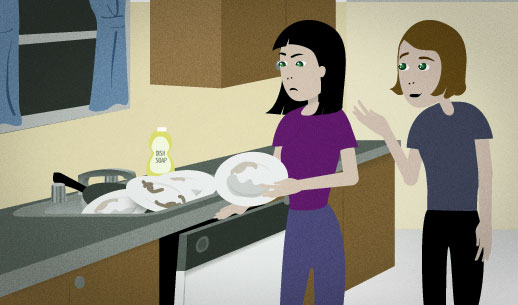“I’ll do the rest by hand.”
You and your roommate had dinner together, and you're now cleaning up. Your roommate is loading the dishwasher, but it's full now. You offer to wash the rest of the dishes and you say this.
I’ll do the rest by hand.
Want Video and Sound? Follow us on YouTube

I'll (do something)
Use "will" to offer to do something, or when you've just decided to do something like in these situations:
("I'll" is short for "I will", of course.)
When you've been planning to do something for a while, don't use "will". Say "I'm ___" or "I'm going to ___".
do the dishes
You can use the verb "do" to talk about washing dishes. "Do" is actually more common than "wash".
the rest (of something)
"The rest" of the dishes are the ones which haven't been washed yet.
You can either say "the rest of ___" or just "the rest":
Why don't you have the rest of the cake?
Why don't you have the rest?
(do something) by hand
When something is done "by hand", it means that a person does it instead of a machine. In the example above, washing dishes "by hand" means washing them in the sink instead of in the dishwasher. It can also mean doing something yourself that people usually hire professionals to do
Other things that you can do "by hand" include:
build a house by hand
wash your clothes by hand
mix the dough by hand
score a test by hand
count something by hand
Notice that it's always "by hand", not "by my hand", "by her hand", "by hands", etc.
